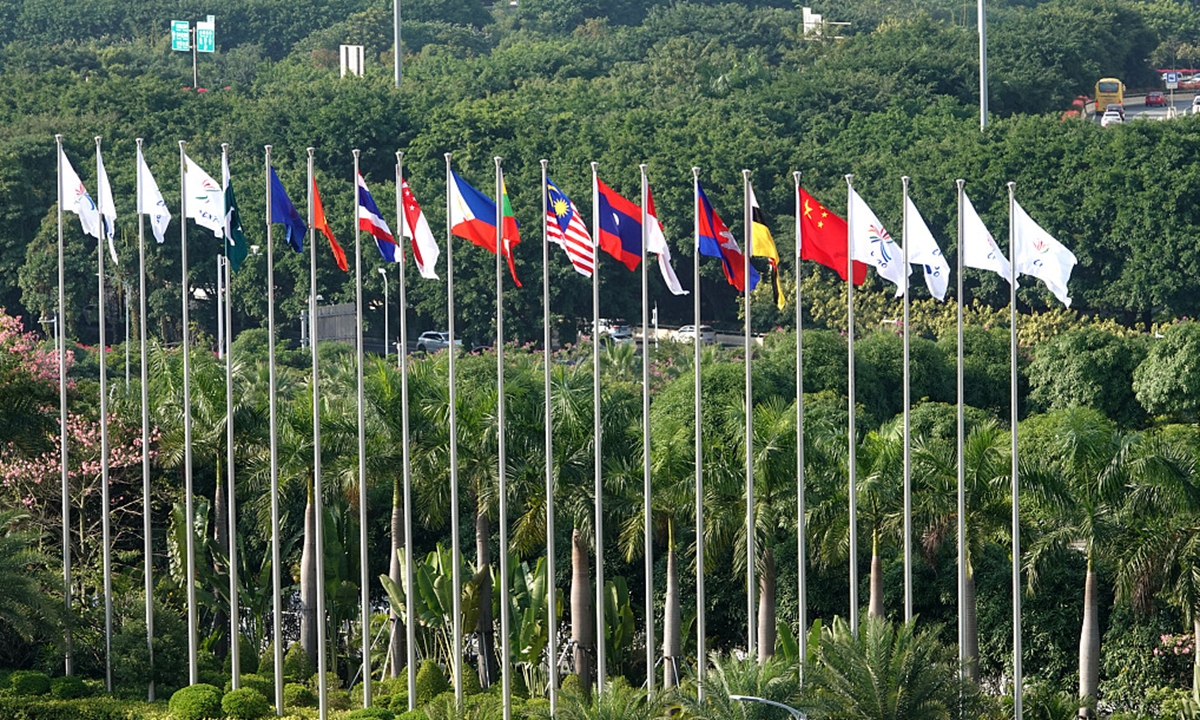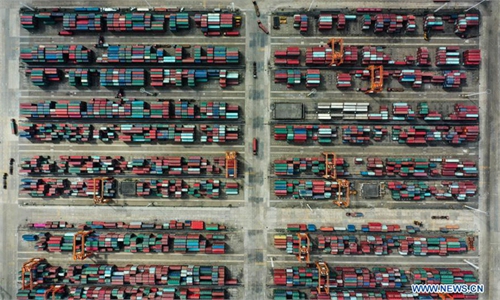Encircle China? Who wants to be bricks on US’ wall against China?: Global Times editorial

China-ASEAN Photo:VCG
From March 31 to April 3, the foreign ministers of four members of the Association of Southeast Asian Nations (ASEAN) - Singapore, Malaysia, Indonesia and the Philippines - as well as the South Korean foreign minister will pay a visit to China consecutively. This follows Chinese State Councilor and Foreign Minister Wang Yi's recent visit to six Middle East countries and Chinese State Councilor and Defense Minister Wei Fenghe's visit to four European countries. Before that, Russian Foreign Minister Sergey Lavrov visited China from March 22 to 23.It has been seen that China is releasing signals to break the US' encirclement through these diplomatic actions. In this regard, whether China explains itself does not matter anymore, because the impact that China's actions are seen to exert is already there. The only thing that we can probably say is that it is actually very easy to break the so-called US' encirclement, or in other words, building circles around China is a false proposition put forward by those who think too highly about themselves.
ASEAN is seen as one of the first regions to be affected by the US-China competition, but the visit of the four foreign ministers to China shows that China shares common interests with those countries in a wide range of issues. These issues include fighting the COVID-19 pandemic and promoting the Regional Comprehensive Economic Partnership (RCEP). Moreover, on the Myanmar issue, China also shares a lot of similar positions with these countries and believes that the issues are Myanmar's internal affairs that should be resolved peacefully within the constitutional and legal framework.
China is the biggest trading partner of almost all ASEAN members. Between Beijing and ASEAN, the natural motivation and inertia to develop relations with each other are extremely strong. Washington's wish to "win ASEAN over" is purely delusional. Without the active participation of ASEAN, building circles around China will become a funny one-man show performed by the US.
As for South Korea, it is one of the US' core allies in the Asia-Pacific region. On Friday, South Korean National Security Adviser Suh Hoon will meet with his US and Japanese counterparts in Annapolis, Maryland. South Korean Foreign Minister Chung Eui-yong is set to visit China on Friday and Saturday. Not long ago, he just attended the South Korea-US "2+2" talks. This is a true reflection of South Korea's attitude of not choosing between China and the US. In this way, it is unrealistic for the US to transform its post-Cold War alliance system directly into an anti-China alliance.
One of the biggest focal points of the Biden administration's anti-China alliance is Europe. However, it is not just south and east European countries that are working closely with China. Western European powers, which stressed that China is "a partner, competitor and systemic rival," are also insisting on their own interests. Angela Merkel, the Chancellor of Germany, said on March 26 that it was important for the EU to have a common identity on China.
The Middle East, except for Israel, is dominated by Islamic states, and it is a US dream to enlist them in an attack on Xinjiang-related issues. But Iran, Saudi Arabia and other countries have made it clear to Beijing that they support China's policies on Xinjiang. Moreover, several Islamic countries have signed a joint letter supporting China's position on issues related to the Xinjiang Uygur Autonomous Region in 2019.
The question is: How can the US turn so many countries with different interests and opinions into bricks to build a wall against China? Washington's elaborate encirclement of China has been blown to a hideous mess just by China's normal exchanges with other countries that had been delayed by the epidemic.
Under the environment of the fierce competition between China and the US, China dares to adhere to principles in other directions and stay firm when it comes to core national interests. It is because we understand that the US' ambition to encircle China seriously violates the basic reality of the international relations in the 21st century, and is doomed to fail. We can develop friendly relations with other countries in a frank and open way to safeguard our national interests.
Washington can never take advantage of China's disputes with other countries to instigate China's neighbors and the EU to go on the US chariot and jointly oppose China. Contemporary international relations are not one-dimensional. The interests of China and other countries are intertwined, and how could it be cut off with a geopolitical knife?
The main theme of diplomacy during the Cold War was alliance and confrontation. Many small countries had no choice but to be involved. But today, the main theme of international relations is balanced diplomacy. All countries have expanded room for maximizing their own interests by taking advantage of major power disputes. The US has been managing with an effort to contain China, but China has followed the normal logic of handling internal and external affairs, going with the trend. If the situation goes on like this, it will be the US that eventually finds it hard to carry on.



